Organic chicken is the healthier, tastier, and more ethical choice for poultry. Raised without antibiotics or hormones, these chickens have access to the outdoors and are fed non-GMO, organic feed. The result is a richer, more flavorful taste, and a healthier option for consumers. By choosing organic chicken, you can support sustainable farming practices and enjoy a delicious meal that is better for you and the environment.
Chickens on Free-range
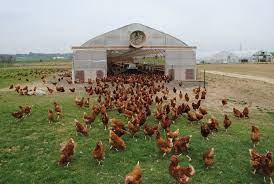
When you hear the phrase ' Organic Chicken' What actually comes to your mind?
Different folks with different strokes
For some, it means chickens raised on pasture or chickens on free range, while some see it as chickens raised solely on organic feed without any synthetic medication ( antibiotics/vaccines), etc
Let's see the actual definition of organic chickens
Also read: What Chickens are best for eggs? ( Here are my 11 best laying breeds)
What Exactly is organic chicken?
Organic chicken refers to chickens that are raised according to strict organic standards, which include requirements for feed, living conditions, and medical treatment.
Specifically, organic chickens are raised without the use of antibiotics, hormones, or genetically modified organisms (GMOs).
They are fed certified organic feed free from synthetic fertilizers, pesticides, and other harmful chemicals.
Organic chickens also have access to outdoor areas, allowing them to engage in natural behaviors such as scratching and
pecking. In addition, organic farmers must provide their chickens with ample space to move around and prevent overcrowding.
According to the USDA, organic chicken must be raised according to strict standards, which include "access to the outdoors,
natural light, and space to move around, and they must be fed 100% organic feed.
" These standards are designed to promote animal welfare, reduce environmental pollution, and support the health of
consumers who choose organic products.
Studies have shown that organic chicken may offer some health benefits over conventionally raised chicken.
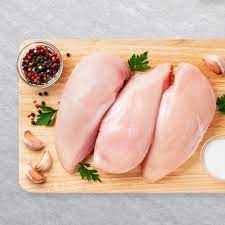
Organic chicken meat
For example, a study published in the Journal of Agricultural and Food Chemistry found that organic chicken had higher levels of
beneficial omega-3 fatty acids and lower levels of potentially harmful omega-6 fatty acids compared to conventionally raised chicken.
Overall, organic chicken farming prioritizes animal welfare, sustainability, and health, resulting in a high-quality, ethical, and
delicious poultry option for consumers.
One of my doubts about organic chicken farming is; whether is it actually feasible to raise organic chicken according to standards,
especially in undeveloped countries.
Personally, as a poultry farmer, I think it (completely organic) is only possible within developed countries where strict biosecurity
and monitoring is observed, unlike in third-world countries.
Before we look at the limitations of organic chicken, let's take a look at some of the benefits of organic chickens
Also read: What Chickens Lay Brown Egg? Here are the 11 Best Breeds...
What Are The Benefits Of Organic Chicken?
Here are some of the benefits of Organic
1. Higher Nutritional Quality:
Organic chicken has been shown to have higher levels of beneficial nutrients such as omega-3 fatty acids and antioxidants
compared to conventionally raised chicken. (source: Ahmed et al., 2017)
2. No Hormones or Antibiotics:
Organic chicken is raised without the use of hormones or antibiotics, which can have negative impacts on both animal and human health.
3. Better Animal Welfare:
Organic chicken is raised in more humane conditions, with access to the outdoors and more space to move around
4. Reduced Environmental Impact:
Organic chicken farming practices aim to minimize the use of synthetic pesticides and fertilizers, which can contribute to environmental pollution and harm wildlife.
5. No GMOs:
Organic chicken feed must be free from genetically modified organisms (GMOs), which can have unknown long-term effects on both animals and humans. (source: USDA, 2021)
6. Tastes Better:
Many people find that organic chicken tastes better than conventionally raised chicken due to its higher nutritional quality and natural living conditions.
7. Supports Sustainable Agriculture:
Organic chicken farming promotes sustainable agriculture practices that support soil health, biodiversity, and long-term food security.
8. Less Risk of Contamination:
Organic chicken is less likely to be contaminated with harmful bacteria such as Salmonella and Campylobacter compared to
conventionally raised chicken due to its higher standards of animal welfare and hygiene. (source: EFSA, 2010)
Overall, choosing organic chicken can provide a range of benefits for both your health and the environment, while also supporting
more humane and sustainable farming practices.
Also read: How Do You Know If a Chick is a Male or Female?
What Are The Limitation And Challenges of Raising Organic Chicken?
1. Higher Costs:
Organic chicken production can be more expensive than conventional chicken production due to the higher cost of
organic feed and the additional labor required for organic farming practices.
2. Lower Yields:
Organic chicken farming can lead to lower yields and slower growth rates compared to conventional farming
practices, which can limit profitability for farmers
3. Pest and Disease Management:
Organic chicken farmers must rely on natural pest and disease management techniques, which
can be less effective than conventional chemical treatments and require more labor and resources.
4. Limited Availability:
Organic chicken may not be widely available in all regions or markets, which can limit consumer access to
organic poultry products.
5. Difficulty in Certification:
Organic chicken farmers must follow strict certification guidelines and undergo regular inspections,
which can be a time-consuming and costly process.
Are There Any Differences Between Organic Chickens And Non-organic Chickens?
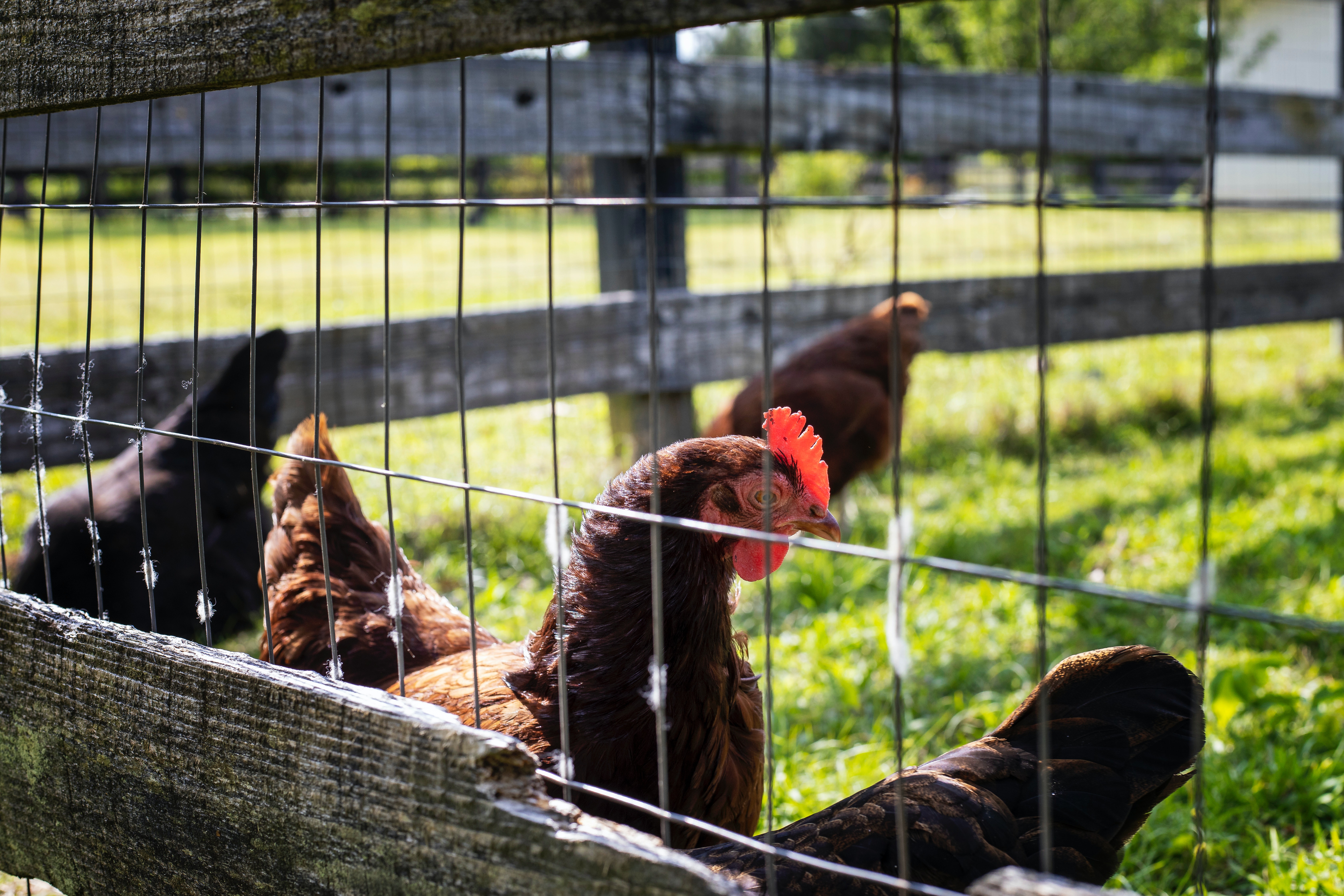
There are differences between organic and non-organic chickens. Here are some of the key distinctions:
I. Feed
Organic chickens are Fed organic feed without pesticides, herbicides, or synthetic fertilizers while Non-organic chickens are Fed
conventional feed, which may contain antibiotics, hormones, and genetically modified organisms (GMOs)
II. Living conditions:
Organic chickens are raised in a free-range environment with access to the outdoors where they can exhibit their natural behavior
like scratching, dust bathing, perching, etc. While Non-organic chickens are raised in crowded indoor facilities
III. Health and treatment:
Organic chickens are Treated with natural remedies or non-antibiotic treatments if they become sick, while Non-organic chickens: Treated with antibiotics to prevent and treat illness
IV. Labeling:
Organic chickens are Labeled "organic" if they meet USDA organic standards. While Non-organic chickens are labeled with terms such as "conventional" or "natural"
However, there are significant differences between organic and non-organic chickens in terms of feed, living conditions, health and
treatment, and labeling. You can make informed choices based on these distinctions and personal values.
How To Choose and Raise A Healthy Organic Chicken
Are you thinking about raising chickens in your backyard, and your desire is to make sure that they're healthy and organic?
If so, you are in the right place! Here are some recommendations on how to pick out and raise a healthy organic chicken.
Firstly, when choosing a chicken, look for breeds that are known for being healthy and hardy. You can look it up online or ask your
neighborhood hatchery for recommendations.
Ensure the rooster you pick is free from any illnesses or parasites and has access to organic feed and clean water.
When raising your chicken, make certain they have lots of space to move around and exercise. They must have to get access to a
a clean and dry coop that offers enough protection from predators and weather elements.
Provide your chickens with a healthy and balanced diet, consisting of organic feed, fruits, vegetables, and grains. Avoid giving
them any processed or junk foods.
Make sure you give your chicken fresh and, smooth water at all times. Keep their water dispenser clean and free of any particles or algae.
Regularly easy for the coop to forestall any buildup of microorganisms or parasites. Change the bedding at least as soon as a
a week and disinfect the chicken coop periodically.
Monitor your chicken's conduct and health. If you be aware of any signs and symptoms of illness, such as lethargy, loss of appetite,
or uncommon droppings, consult with a veterinarian immediately.
Lastly, give your chickens lots of love and attention. Spend time with them, and you'll find that they're not solely exquisite pets, but
additionally a supply of fresh eggs and meat.
Understanding Organic Certification
When it comes to selecting and elevating organic chickens, getting organic certification is a vital thing to consider.
Organic certification is a label given to products, consisting of fowl meat and eggs, that meet precise standards set by means of regulatory bodies.
In order for poultry to be certified as organic, it must meet the following requirements:
Be raised on organic feed that is free from any artificial pesticides, herbicides, or fertilizers.
Be free from antibiotics and growth hormones.
Have to get access to the outdoors, fresh air, and natural sunlight.
Be raised in clean and wholesome surroundings with enough of space to move around.
As a consumer, when buying natural chicken meat or eggs, look for products that have been licensed with the aid of an authentic organic certifying agency.
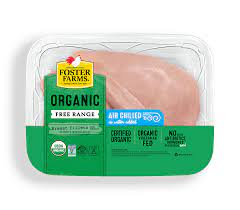
These businesses normally have strict requirements and policies that have to be met in order for a product to be certified as organic.
When raising your own natural chickens, it's important to observe organic practices and hints in order to maintain organic certification.
This consists of presenting organic feed, keeping off the use of antibiotics or increase hormones, and ensuring that your chickens
have to get access to the outside environment.
By acquiring an organic certification and following organic practices, you can make sure that the chickens you pick and raise are
healthy, organic, and free from unsafe chemical compounds and additives.
You may want to go to organic chicken keep, and one aspect you must be careful about is their feed, which is different from
conventional feed. Let's look at some tips about organic chicken feed
Organic Chicken Feed
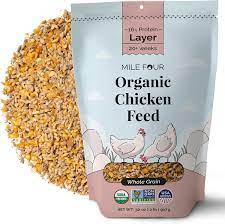
As you all know, organic chicken feed is becoming an increasingly popular choice among chicken owners who want to promote the health and well-being of their birds.
Organic feed is made from certified organic ingredients that are grown without synthetic pesticides, fertilizers, or GMOs and do not contain any antibiotics, hormones, or other artificial additives.
There are many benefits to using the organic chicken feed, including better overall health and performance from your flock, better egg quality, and better growth rates.
The organic feed contains natural nutrients, vitamins, and minerals that strengthen the immune system and prevent disease.
When choosing organic chicken feed, it's important to consider the needs of your flock and read labels carefully to ensure that the feed you choose meets its nutritional requirements.
For those who want to make their own organic feed, it's important to research and understand the necessary ingredients and
ratios.
To ensure a smooth transition, it's important to introduce organic feed gradually and provide clean water at all times.
Common mistakes to avoid include assuming that all organic feed is created equal and not factoring in the cost.
Organic chicken feed is a healthy choice for your flock that promotes their health and well-being. Choosing the right organic
feed and taking the time to transition your birds gradually, you can help ensure that your flock is happy and healthy for years to
come.
Conclusion:
Raising organic chickens is a rewarding and fulfilling experience that can provide you with fresh and healthy eggs and meat
. By choosing healthy breeds, providing a clean and safe living environment, and following organic practices, you can ensure that
your chickens are healthy and free from harmful chemicals and additives.
Plus, there's nothing quite like the satisfaction of knowing that you're providing your family with high-quality, organic food that
you've raised yourself. So, if you're considering raising chickens, why not take the organic route and enjoy all the benefits that come with it?
Sources:
- USDA National Organic Program. (n.d.). Organic Livestock Requirements. Retrieved from https://www.ams.usda.gov/rules-regulations/organic/livestock-requirements
- Ahmed, S., Roohi, N., Siddiqui, M. A., & Ansari, R. A. (2017). Comparative study of fatty acid profiles of organic and conventional chicken meat. Journal of Agricultural and Food Chemistry, 65(16), 3382-3387.
- EFSA. (2010). Analysis of the baseline survey on the prevalence of Campylobacter in broiler batches and of Campylobacter and Salmonella on broiler carcasses in the EU, 2008. EFSA Journal, 8(1), 1503.
Need a website or other IT services? Visit our website!
Share on Twitter Share on Facebook
Comments
There are currently no comments
New Comment